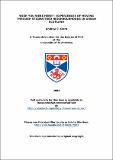Wish you were here?: experiences of moving through stigmatised neighbourhoods in urban Scotland
Abstract
This thesis is about the use of the term social exclusion in contemporary Scotland and
how it has given rise to the idea of 'excluded spaces' in political and academic
commentaries on deprived neighbourhoods. It argues that, despite criticism, the term
offers a useful way of re-assessing disadvantaged places, such that space (for
example, in the guise of socio-spatial segregation) should be considered not only an
outcome but also an input into processes of exclusion. This is illustrated through
exploration of the reproduction of the frequently negative place-images surrounding
two deprived neighbourhoods in urban Scotland. The thesis explores how such
representation may stigmatise residents therein, ultimately resulting in the production
of landscapes of exclusion. Use of a range of qualitative methods (though primarily
biographical interviews) demonstrates how negative place-images are constructed and
remain resilient to change while also revealing the concrete outcomes of such
'imagined' geographies. Overall, the thesis makes three main points. First, that the
construction of 'imagined' and 'real' places are fluid and dynamic processes and
differences between 'images' and 'realities' of places are neither as clear cut, nor as
'true' or 'inaccurate' as might be assumed. Second, that 'real' and 'imagined'
representations of place are reproduced through practices in, and attitudes towards,
place. And third, that migration processes are influenced by, and influential to, the
construction of social and place identities. Construction of socio-spatial stereotypes
reveals space to be both an outcome and input into processes of exclusion while also
demonstrating how many of the taken-for-granted assumptions about disadvantaged
neighbourhoods might be considered place-myths.
Type
Thesis, PhD Doctor of Philosophy
Collections
Items in the St Andrews Research Repository are protected by copyright, with all rights reserved, unless otherwise indicated.

